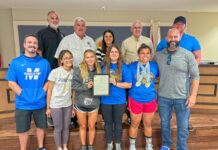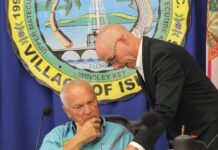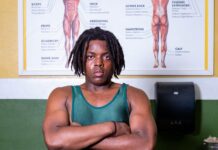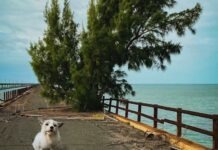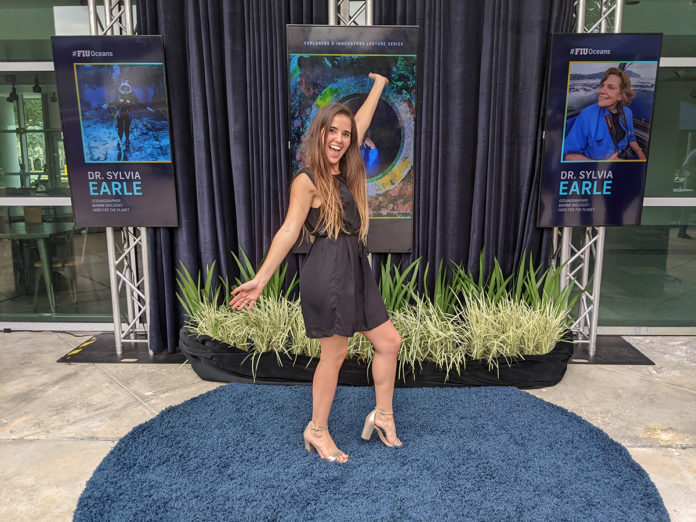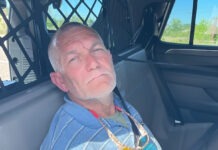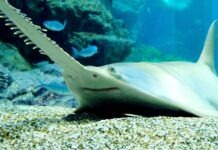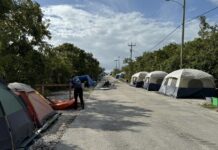It’s pretty wild to win an award with grant money to pursue your dreams. It’s even more badass to have pioneering National Geographic explorers Sylvia Earle and Mireya Mayor present it to you.
Last month, that’s exactly what happened to Keys local Cathy Guinovart.
“This award makes me feel reconnected to the person I was when I fell in love with nature,” Guinovart, who is from Key Largo, told Keys Weekly. “To that kid that had dirty feet and was walking through the woods against everyone’s advice to look for lizards, birds, snails or anything else I could find. To that kid who would wake up my entire household every weekend at 5 a.m. to go out on the boat and snorkel at the reef. It makes me reflect on who I am and why I do what I do, and it all goes back to these formative moments for me.”
The avid freediver was awarded Florida International University’s (FIU) inaugural Women Explorers Award and $5,000 to further her research. Her project aims to create an effective and just system of ecological knowledge exchange in Mayan communities. Guinovart hopes to create a framework that incorporates western, local and indigenous knowledge and ways of engaging with the environment. Her ultimate goal is to foster more complete, holistic understanding of places.
Guinovart recalled her own experiences in the Keys waters and what she’s learned from fishermen, locals and school. She said, “When it comes to understanding science and the environment, there is so much richness tied in with our cultural and local understandings of a place. I want to explore that kind of understanding and wisdom, which often won’t be found in scientific journals or textbooks.”
In presenting Guinovart with her award, legendary oceanographer and explorer Earle recalled her own start in exploration. It began in the 1970s, when she was able to spend real, transformative time underwater.




“They didn’t expect women to apply at all and when some of us did and had credentials at least as good as men, James Miller said, ‘Well half the fish are female, I guess. We could put up with a few women,’” she laughed. “They called men ‘aquanauts’ and the women ‘aquababes’ and ‘aquanauties.’”
Mayor, who heads up FIU’s Exploration and Science Communications department as well as this new award, also recalled her own beginnings. She said, “I grew up with very little means. … A grant just like what I’m offering now and that I have the honor of overseeing gave me my start and led me to South America. I am so excited to be kicking this off now for the next generation.”
Both Mayor and Earle are considered pioneers in the field of exploration, which traditionally has been very male-dominated.
“To this day, I’m usually the only woman on an expedition,” Mayor shared. “What we see at the forefront is usually white, older, khaki-clad men.”
Once a Miami Dolphins cheerleader, Mayor recalled science professors wondering if she’d contribute to the field. She used to downplay her femininity in hopes of being taken more seriously, but eventually found her stride and instead leaned hard into who she was. She became known for her pink field boots and machete.
“I just didn’t like the idea of being pigeonholed because of a stereotype,” she said. “That’s one of my messages when I talk to young kids, especially female audiences: don’t let anyone put you in a box. You can be an athlete, dancer, or anything, and still be a scientist.”
Acting as National Geographic’s first female and first female Hispanic wildlife correspondent, Mayor realized the power of being on television “in front of that many eyes of little girls and young women who say, ‘I didn’t know I could do this. I am going to do this because I saw you do it.’”
She added, “Representation matters. The future generation of explorers needs to see themselves in and identify with the current faces of exploration.”
This award is just one of the ways that Mayor hopes to diversify the faces of exploration. This is especially important because women only account for 28% of the workforce in STEM, she said.
“This award is to develop their research experience and move their work forward,” she said. “We need their work.”
In total, 12 female finalists were all awarded money to continue exploring and impacting their world. Their projects run the gamut from shark conservation to sustainability campaigns to research on human diseases.
Celebrating with all 12, Earle said, “Women finalists, you are the future. We are so excited for the work you’re doing now and the work you’ll do moving forward.”






